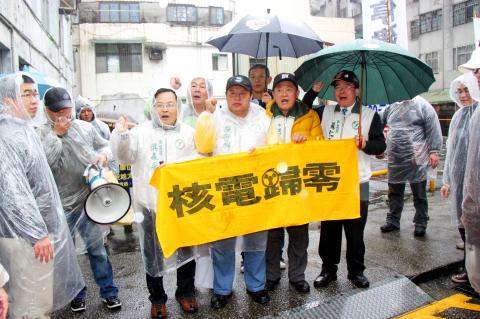President Ma Ying-jeou (馬英九) yesterday defended the government’s stance on the nation’s nuclear power program amid disputes over the construction of the Fourth Nuclear Power Plant in Gongliao District (貢寮), New Taipei City (新北市), and said that the government will ensure nuclear safety before allowing commercial operation of the plant.
“We can reduce nuclear power gradually, but it will be hard to achieve this goal all in a single step,” Ma said at a meeting with Chinese Nationalist Party (KMT) members in Keelung.
Ma, who is also KMT chairman, said he has instructed the Executive Yuan to explain the consequences and advantages if the construction of the power plant was halted and promised that the government will respect any decision made by the public on the issue.

Photo: Lu Hsien-hsiu, Taipei Times
Confronted with growing opposition to the government’s plan to complete construction of the plant and concerns over nuclear safety, Ma’s administration announced earlier this month that the issue of the Fourth Nuclear Power Plant’s construction would be settled by a national referendum.
Premier Jiang Yi-huah (江宜樺) said on Friday that he would resign if the government loses the vote and construction of the plant is halted, adding that if construction is halted it could lead to bankruptcy for state-owned Taiwan Power Co (Taipower, 台電) as well as cause other problems such as power shortages.
The referendum proposal from the government attracted criticism from the Democratic Progressive Party and anti-nuclear groups, as they said the move was designed to weaken the anti-nuclear movement, given the high threshold required for a referendum to pass.
A referendum would require mobilizing more than 9.15 million people, or half the eligible voters, to vote and would need to achieve 4.57 million “yes” votes to have the plant’s construction halted.
Ma declined to discuss the referendum yesterday, but promised that the government will not deceive the people nor generate public fear in an attempt to continue the construction.
“We will let the people make the final decision [on the construction of the power plant], he said, while stressing that most of the plant’s construction has been completed and that the government will invite foreign experts on nuclear power to inspect the safety of the plant before allowing its commercial operation.
In calling for KMT members’ support for government policies, Ma also said that the Executive Yuan will communicate with the public regarding pension reform, as the government’s pension reform proposal will be sent to the legislature next month for approval.

‘DENIAL DEFENSE’: The US would increase its military presence with uncrewed ships, and submarines, while boosting defense in the Indo-Pacific, a Pete Hegseth memo said The US is reorienting its military strategy to focus primarily on deterring a potential Chinese invasion of Taiwan, a memo signed by US Secretary of Defense Pete Hegseth showed. The memo also called on Taiwan to increase its defense spending. The document, known as the “Interim National Defense Strategic Guidance,” was distributed this month and detailed the national defense plans of US President Donald Trump’s administration, an article in the Washington Post said on Saturday. It outlines how the US can prepare for a potential war with China and defend itself from threats in the “near abroad,” including Greenland and the Panama

A wild live dugong was found in Taiwan for the first time in 88 years, after it was accidentally caught by a fisher’s net on Tuesday in Yilan County’s Fenniaolin (粉鳥林). This is the first sighting of the species in Taiwan since 1937, having already been considered “extinct” in the country and considered as “vulnerable” by the International Union for Conservation of Nature. A fisher surnamed Chen (陳) went to Fenniaolin to collect the fish in his netting, but instead caught a 3m long, 500kg dugong. The fisher released the animal back into the wild, not realizing it was an endangered species at

The High Prosecutors’ Office yesterday withdrew an appeal against the acquittal of a former bank manager 22 years after his death, marking Taiwan’s first instance of prosecutors rendering posthumous justice to a wrongfully convicted defendant. Chu Ching-en (諸慶恩) — formerly a manager at the Taipei branch of BNP Paribas — was in 1999 accused by Weng Mao-chung (翁茂鍾), then-president of Chia Her Industrial Co, of forging a request for a fixed deposit of US$10 million by I-Hwa Industrial Co, a subsidiary of Chia Her, which was used as collateral. Chu was ruled not guilty in the first trial, but was found guilty

DEADLOCK: As the commission is unable to forum a quorum to review license renewal applications, the channel operators are not at fault and can air past their license date The National Communications Commission (NCC) yesterday said that the Public Television Service (PTS) and 36 other television and radio broadcasters could continue airing, despite the commission’s inability to meet a quorum to review their license renewal applications. The licenses of PTS and the other channels are set to expire between this month and June. The National Communications Commission Organization Act (國家通訊傳播委員會組織法) stipulates that the commission must meet the mandated quorum of four to hold a valid meeting. The seven-member commission currently has only three commissioners. “We have informed the channel operators of the progress we have made in reviewing their license renewal applications, and